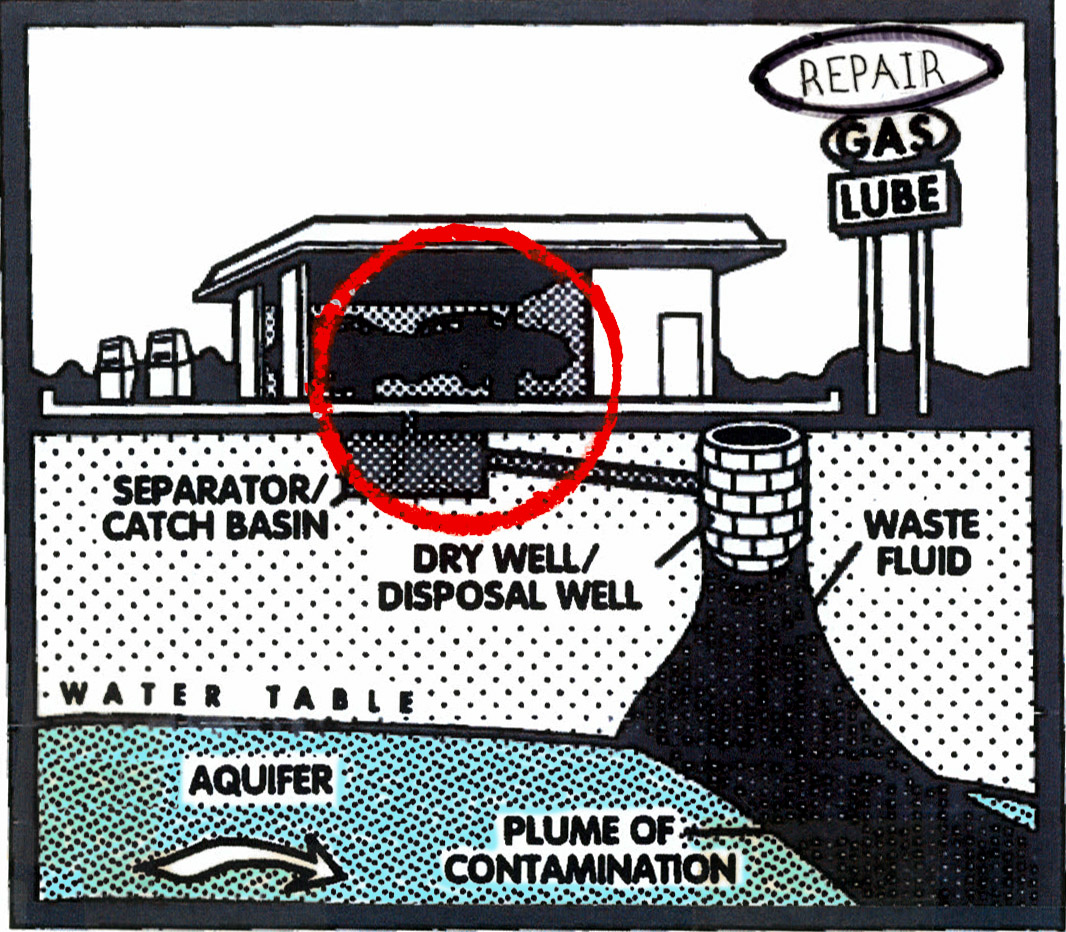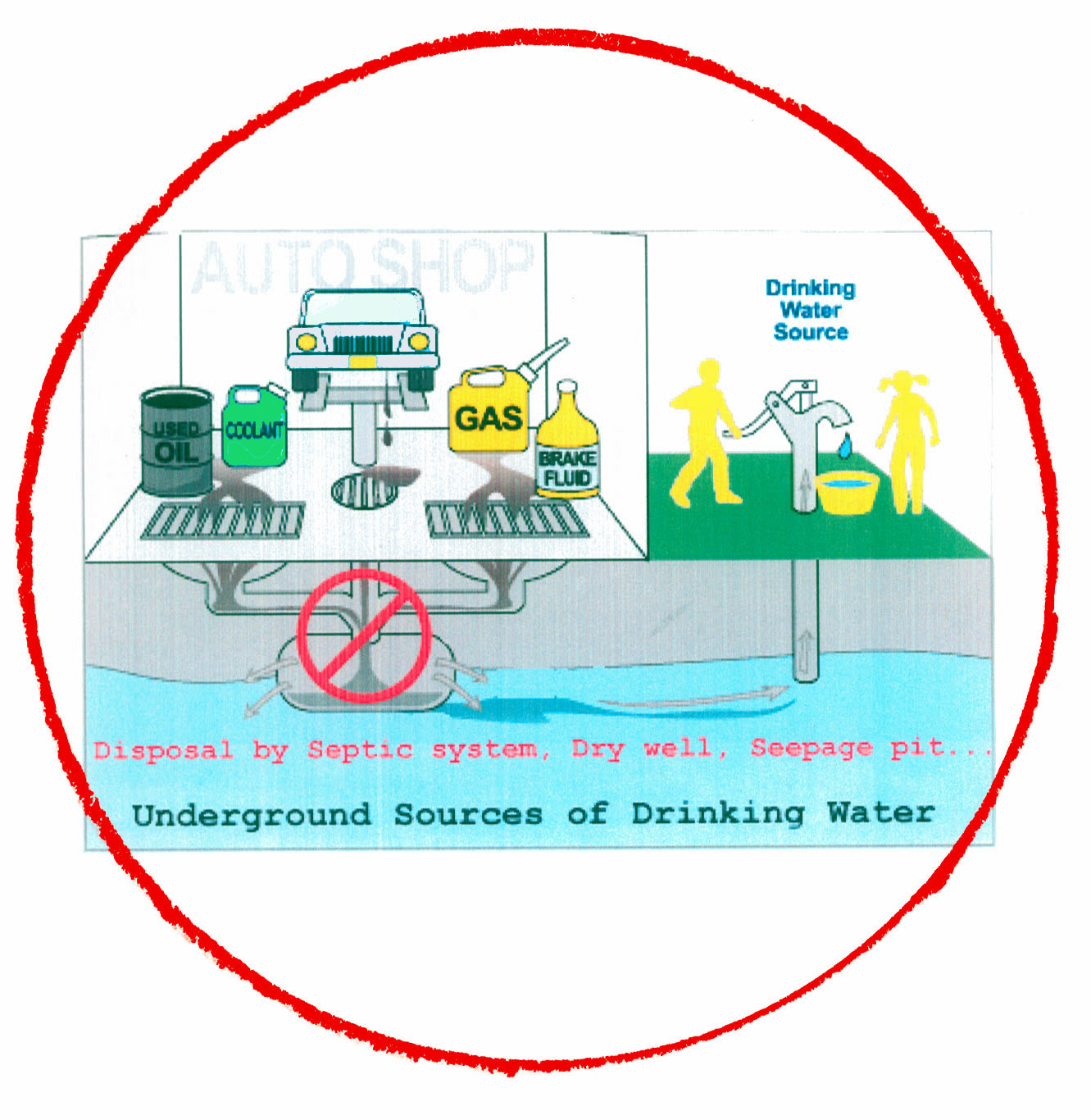.JPG)
What is the Underground Injection Control (UIC) Program?
The UIC Program is part of the Safe Drinking Water Act which was passed in 1974 to ensure safe drinking water for the public. Maryland has implemented the UIC Program since 1984.
What is the purpose of the UIC Program?
The UIC Program works to prevent contamination of underground sources of drinking water (USDW) by regulating the discharge of hazardous and non-hazardous fluids into subsurface disposal systems. This is important because over 30% of Marylanders get their drinking water from USDW and groundwater affects surface water due to groundwater's subsurface flow into rivers and streams.
What is a Subsurface Disposal System?
In areas not served by a public wastewater treatment system, typically rural and suburban areas, domestic wastewater is usually discharged into shallow subsurface disposal systems. These systems include septic systems (septic tank and drainfield), dry wells, seepage pits and drainage holes.
Federal regulations also call shallow subsurface disposal systems Class V 'injection wells' even though these disposal systems are not 'wells' in the commons usage of this word. The UIC Program regulates different classes of subsurface disposal systems, but in Maryland we only have Class V disposal systems.


Why is it a potential problem if motor vehicle maintenance/service or industrial process (non-domestic) wastewater discharges into a subsurface disposal system?
Subsurface disposal systems are designed to treat domestic wastewater. Motor vehicle maintenance/service and industrial process wastewater may contain contaminants not found in domestic wastewater. The disposal of these contaminants into a shallow subsurface disposal system can inhibit wastewater treatment, cause the disposal system to fail and contaminate USDW. If this happens, drinking water wells may need to be deepened and/or water treatment may need to be installed. Significant costs are typically associated with managing and remediating contaminated groundwater. The EPA banned the discharge of motor vehicle maintenance/service wastewater into subsurface disposal systems in 2000.
How is the Department working to protect Underground Sources of Drinking Water (USDW) from the discharge of motor vehicle maintenance/service or industrial process (non-domestic) wastewater into subsurface disposal systems?
The Department inspects businesses that may discharge motor vehicle maintenance/service and industrial process wastewater into subsurface disposal systems. We focus on urban and suburban areas that are not served by public wastewater treatment systems. Other types of wastewater such as heating/cooling water, and water treatment backwash may also discharge into the subsurface but pose a lower risk to USDW.
How do I know if I have a motor vehicle maintenance/service or industrial process wastewater subsurface disposal system?
If your workplace is not connected to a public wastewater treatment system and generates non-domestic wastewater, this wastewater is either stored in a holding tank for offsite hauling and treatment or is discharged onsite. It is important for you to find out where the non-domestic wastewater goes.
If the wastewater discharges onsite it often flows to a pre-treatment tank such as an oil/water separator. Both a holding tank and an oil/water separator (or other type of treatment tank) require periodic pumping. A holding tank will likely require more frequent pumping. A review of building plans, tank pump-out records and talking with your wastewater hauler may help to determine if the wastewater is being stored in a holding tank for offsite removal and disposal, or if the wastewater discharges onsite.
Facilities without a proper treatment system and discharge permit are not allowed to discharge wastewater directly onto the ground where it can seep into groundwater or flow into stormwater drains, ditches and surface waters.
What should I do if I discharge motor vehicle maintenance/service or industrial process wastewater into a subsurface disposal system?
Contact the Department's Groundwater Permits Division, Underground Injection Control Program at 410.537.3778 for information on options for properly managing wastewater and complying with Federal and State regulations.
What are my options for managing motor vehicle maintenance/service or industrial process wastewater?
-
Permanently close the close the drain(s) with concrete and institute pollution prevention practices to prevent wastewater from discharging to a subsurface disposal system, onto the ground, or to storm drains, ditches or surface waters,
-
Install a holding tank and have the tank pumped regularly by a licensed hauler, or
-
Apply to MDE for discharge permit authorization to discharge industrial process wastewater. The discharge of motor vehicle maintenance/service wastewater into subsurface disposal systems has been prohibited since 2000. However, depending on the installation and use history of the subsurface disposal system, permit authorization may be possible. For more information on discharge permits, please contact the Department's Groundwater Permits Division at 410.537.3778.
How should vehicle and equipment washwater be managed?
Vehicle and equipment washwater can degrade ground and surface water quality. Managing engine and undercarriage washwater is very important, particularly if degreasing products are used.
Please contact the Department for guidance if exterior, engine or undercarriage washwater discharges into a shallow subsurface disposal system, seeps into the ground or discharges into storm drains, ditches or surface waters. A permit may be required for onsite discharge of vehicle or equipment washwater.
The Department proposes to issue a new general permit for the discharge of exterior vehicle washwater to groundwater from commercial and business-related vehicle washing operations. The draft permit and fact sheet can be found here.
Recommendations
Take steps to manage motor vehicle maintenance/service and industrial process wastewater so that there is minimal risk of ground or surface water contamination. Most business operators that do vehicle maintenance/service have found they can operate effectively without floor drains by instituting pollution prevention practices. These practices may include common sense solutions such as using drip pans, absorbent for spills and having secondary containment for any drums or tanks containing fluids or wastewater.
Proper management of motor vehicle maintenance/service and industrial wastewater protects our underground sources of drinking water and surface waters and protects business owners/operators from incurring the high costs associated with managing and remediating contaminated groundwater.
Are there other types of Underground Injection Disposal Systems?
Yes. Federal regulations define 6 classes of injection wells. In Maryland, there are currently only Class V shallow subsurface disposal systems.
The other five classes of injection wells are: deep injection of hazardous and nonhazardous waste (Class I)*, oil and gas wastewater disposal wells (Class II), solution mining wells (Class III) and carbon sequestration wells (Class VI). Class IV wells, which discharge hazardous wastewater into shallow subsurface disposal systems, are banned.
*Note: Maryland prohibits Class I hazardous wastewater injection wells.
For more information on injection wells from EPA:
http://water.epa.gov/type/groundwater/uic/wells.cfm 
Contact Information
Please contact the Department at (410) 537-3778 for more information.
Additional Information and Related Links